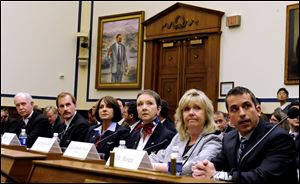
Air controller believed landing in Hudson doomed plane
2/25/2009
From left, Capt. Chesley Sullenberger III, 1st Officer Jeffrey Skiles, flight attendants Sheila Dail, Donna Dent, and Doreen Welsh, and air traffic controller Patrick Harten testify before the subcommittee of the House Transportation and Infrastructure Committee. They spoke on the safe landing the US Airways Flight 1549.
WASHINGTON - The air traffic controller who handled US Airways Flight 1549 thought ditching in the Hudson River amounted to a death sentence for all aboard.
Now the veteran pilot who pulled off the feat says pay cuts are driving experienced pilots from the cockpit.
"People don't survive landings on the Hudson River," 10-year controller Patrick Harten told the House aviation panel yesterday in his first public description of how he tried to guide the jetliner that lost power in both jets when it hit Canada geese after takeoff from New York's LaGuardia Airport.
"I thought it was his own death sentence," Mr. Harten said of the moment US Airways pilot Chesley "Sully" Sullenberger III radioed he was going into the river. Defying the odds, Mr. Sullenberger glided the Airbus A320 down in one piece, and all 155 aboard survived the Jan. 15 landing.
Mr. Sullenberger, 58, who joined a US Airways predecessor in 1980, and his copilot, Jeffrey Skiles, said experienced pilots are quitting over deep cuts in pay and benefits.
Mr. Skiles said unless federal laws are revised to boost labor-management relations, "experienced crews
in the cockpit will be a thing of the past." Mr. Sullenberger added that with-
out experienced pilots, "we will see negative consequences to the flying public."
Mr. Sullenberger testified his pay has been cut 40 percent in recent years and his pension terminated and replaced with a promise "worth pennies on the dollar" from the federal Pension Benefit Guaranty Corp. The cuts followed a wave of airline bankruptcies after the Sept. 11 attacks compounded by the recession, he said.
Mr. Harten, the 35-year-old controller, riveted the hearing with his account of the 3 1/2 minutes during which he spoke with the crippled jetliner.
When Mr. Sullenberger said he couldn't make it back to LaGuardia or to Teterboro Airport in New Jersey and would ditch in the river, Mr. Harten testified, "I believed at that moment I was going to be the last person to talk to anyone on that plane alive."
When Mr. Harten directed Mr. Sullenberger to turn toward Teterboro, the pilot responded: "We can't do it. We're going to be in the Hudson." "I asked him to repeat himself even though I heard him just fine," Mr. Harten said. "I simply could not wrap my mind around those words."
At that moment, Mr. Harten said, he lost radio contact with the flight and was certain it "had gone down."
"During the emergency itself, I was hyperfocused," Mr. Harten said. "I had no choice but to think and act quickly and remain calm. But when it was over it hit me hard."
Mr. Harten was replaced at the radarscope after the plane went down. Isolated down the hall, Mr. Harten thought the worst had happened. "It felt like hours" before he learned everyone survived.